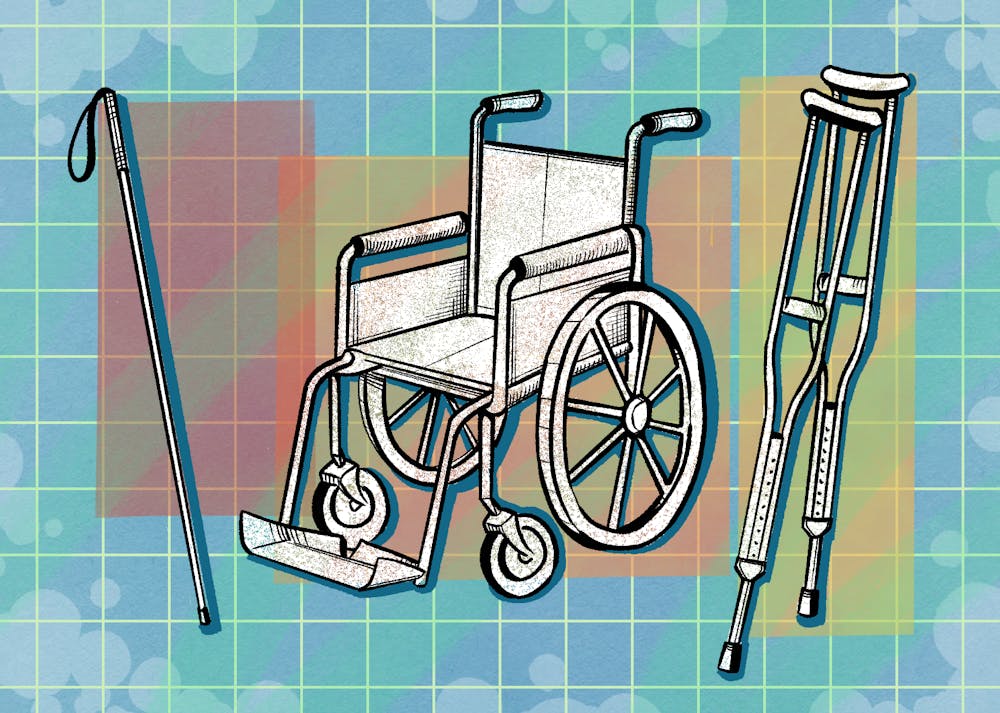In an event hosted by the RISE Center on Feb. 19 titled "Disability and Didactics: How we can advocate for students with disabilities in STEM," participants delved into strategies for enhancing support for students with disabilities in STEM fields.
The session highlighted the need for updated perceptions and practices surrounding disability, accommodations and inclusion within educational frameworks and beyond.
Vincent Truong, a junior studying biochemistry and psychology, was a main speaker at the event and began by defining impairment and disability.
"A disability is any restriction or lack of ability to perform an activity in the manner of, or within a range of, what's considered typical or nontypical," Truong said.
This expanded definition serves to broaden the understanding of disabilities, moving the discussion beyond physical impairments to include a wider spectrum of challenges. By doing this, the event sets the stage for addressing the complex needs of individuals with disabilities in a more inclusive and comprehensive manner.
The dialogue then ventured into the often-neglected sphere of invisible disabilities.
"We're going to focus on how to accommodate not necessarily the physical disabilities, but ... what's not mandated, these invisible disabilities," Truong said.
This discussion highlighted the essential need for advocacy and accommodation strategies that address the entire range of disabilities, including both visible and invisible conditions.
The process for students to receive accommodations, such as hearing devices or additional test time, involves submitting documentation to Student Accessibility and Inclusive Learning Services. Once approved, an accommodation letter is sent to the student, who must then coordinate with SAILS staff. Finally, an individualized letter is sent every semester to each of the student's instructors, who should then implement the accommodations.
This process can be seen as convoluted by some students when weighing the pros against the effort of the application and the possibility of rejection.
"Sometimes (students are) not fully accommodated, and they need to spend that semester without any accommodations," Truong said.
This draws attention to the procedural and systemic barriers that can prevent students from accessing essential accommodations, emphasizing the need for systemic changes.
A number of these changes, including live captioning services, could benefit all students, Truong said.
"Inclusion creates equity and opportunities for those with disabilities ... and also helps those beyond just experiencing disabilities," Truong said.
Challenging current misconceptions, the session also emphasized an understanding of the fluid nature of disabilities and the need for adaptable support systems.
"Disabilities aren't static; they are changing over time," Truong said.
Sara Brownell is a president's professor at ASU's School of Life Sciences and director of the RISE Center. According to Brownell, support strategies often suffer because of their inability to adapt.
"We have recognized that with evolving educational structures and teaching strategies, often students with disabilities do not get the accommodations that they need because the accommodations don't keep up with the changing education," Brownell said in an email.
Baylee Edwards is a graduate student studying biology and helped organize the RISE Center event. She said part of the workshop's design involves keeping students and professors updated on current educational research in engaging ways.
"Most people will not search for and read scientific articles in their free time," Edwards said in an email. "It is part of our responsibilities as researchers to find ways to communicate our findings with the people who can use them, and workshops and events are a great way to read people."
There are also additional challenges involved in the process, such as the lack of disability awareness among professors.
"Instructors need to know that most students with disabilities have invisible disabilities – such as depression or ADHD," Brownell said in an email. "Instructors should be aware of universal design for learning, so they create their classrooms from the beginning thinking about students with different challenges. Instructors should know that their teaching decisions can affect students in different ways, and be open to learning from them what might be best for their accommodations."
This underscores the importance of raising awareness, with workshops serving as one vehicle for progress. As part of the RISE Center's ongoing commitment to disability advocacy, the Feb. 19 event is one of many designed to address various aspects of inclusivity in education.
"We have another workshop on March 18, and Sara Brownell will be leading the workshop to discuss research from the RISE Center related to LGBTQ+ students’ experiences in undergraduate STEM courses," Edwards said.
The RISE Center's recent event marks an important step in the ongoing efforts to elevate awareness for the changing needs of students with disabilities. The hope is that such efforts will prompt enhancements in accommodations, facilitating the necessary support for all students to achieve success.
Edited by River Graziano, Sadie Buggle and Grace Copperthite.
Reach the reporter at dmanatou@asu.edu.
Like The State Press on Facebook and follow @statepress on X.
Dimitra is a junior studying biomedical engineering and physics. This is her second semester with The State Press. She has also worked as a research assistant in Kirian Lab.




